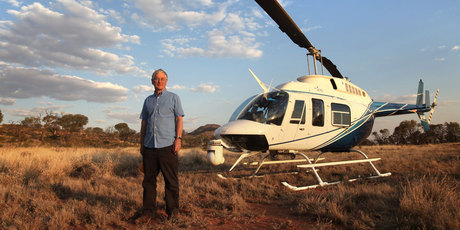
Australian businessman Dick Smith, seen here with his LongRanger helicopter in the Australian outback, is on a mission to change big business. Photo / Nick Graalman.
Australian electronics retail legend Dick Smith is on a crusade to change the way big businesses operate and has New Zealand in his sights.
Best known here as the founder of Dick Smith Electronics, the entrepreneur is heading to New Zealand next month with the same message he's been pushing at home.
Pressure on big businesses to provide never-ending profit growth is driving our economies towards a big brick wall, he says.
"Anyone with any common sense knows that perpetual growth in a finite world is not possible.
"I can tell New Zealand, just like Australia or America, perpetual growth in the use of resource and energy is impossible. It's a finite planet."
Smith, who last spoke publically in New Zealand about ten years ago, will address Kiwi business leaders at an event in Queenstown next month called Tomorrow's Business.
He admits his knowledge of the New Zealand business world is limited but says he has "heard complaints about lack of growth".
"At the present time if we don't have perpetual growth our economies will collapse. And so the situation you're leading yourself into in New Zealand is going to be a disaster.
"Both economists and cancer cells believe in perpetual growth. And cancer cells quite often kill the host."
Smith describes himself as strong right-wing capitalist who has done "very well" out of financial growth.
"But I like exciting challenges and I've got grandchildren now and I'm concerned for them.
"None of this will affect me, I've probably got another 20 years in me. I could shut up and say nothing. But I think we should be discussing this."
His firm belief is that we can run economic systems without the need for constant, hard growth. If not, "we're all doomed".
"You can still have growth in efficiencies and quality of life but just not in using more and more resources."
Laws would need to be introduced which forced businesses to operate more sustainably, although stopping economic growth suddenly would cause recession, he says.
"But capitalism is incredibly resilient so if we brought laws in like that over a period of time, it'd just operate around it.
"As long as it was an even playing field, we'd still be successful, we just wouldn't dig more out of the ground and we'd be doing more recycling."
He pointed to a company like Tesltra in Australia, which he says tends to focus more on growing the returns to investors than the shareholder value.
"It's working harder on saving money so it's giving a greater return rather than boosting their consumption."
Smith will be joined in Queenstown by business and economic commentator Rod Oram and Sam Johnson, of Student Volunteer Army fame.
Tomorrow's Business organiser Andrew Martin described Smith as "a dynamo".
"Dick is doing some great stuff and is being recognised globally for his efforts in raising awareness around some of the major issues that will impact economies and society over the coming years.
"He is ahead of the curve on many issues, that's why he has been so successful over the years."
Born Richard Harold Smith, the businessman, aviator, and political activist sold Dick Smith Electronics in 1982 to Woolworths for $20 million.
His status has grown across the Tasman since he started Dick Smith Foods in 1999 and Australian Geographic in 1986.
His food company is marketed as a fight against foreign ownership of Australian food producers. The company sells only foods produced in Australia by Australian-owned companies.
Smith recently prepared a magazine called Forbidden Ideas to go as a paid advertising insert in 2.4 million newspapers across Australia.
He was outraged when parts of the media rejected the magazine and he called on Australians to tweet Rupert Murdoch stating, "Mr Murdoch - tear down this wall. Reverse the Dick Smith censorship".
Business leaders in Australia have become so ruthless that all basic honesty and fairness has gone out of business, he says.
But he also acknowledges that any chairman of a public company who doubted growth would be "crucified".
"I talk to some of these top business leaders in public companies and they say 'Dick, off the record, I agree. What's we're having to do now to ensure profit growth is not what we like to do but there's no alternative and we don't know how it will end and we're worried'."
He expects a positive reaction to his message from New Zealand business leaders next month.
"I'm just telling facts. I'm not saying we should stop growth immediately or that we haven't benefited from growth."
Tomorrow's Business is being held Friday September 14.
Profits from the event go toward a Queenstown Lakes' community engagement initiative Shaping Our Future.
